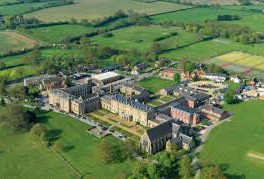It’s all about the whole child, Lee Hawkes tells Melanie Butler
“EFL teachers tend to be solitary. When I was teaching in London, I moved from school to school. We all did. I’d get friendly with someone when I was teaching in the West End, and six weeks later I’d run in to them teaching in Hampstead.”
I have grabbed a few minutes with Lee Hawkes, Director of the Summer school at St Edmund’s College, Ware. It’s the oldest Catholic boarding school in Britain, founded 450 years ago, and a permanent fixture at the top of the EL Gazette rankings. I want to find out why boarding schools do so well.
“When I got my first job as the EAL teacher at St Edmund’s, it was a culture shock. This was an institution. A community. In a language school they just leave teachers to get on with it.”
I get the impression that the solitary Hawkes was uncomfortable at first. Until he began to understand where the focus of this community was.
The focus of a boarding school is on the whole child. “You see a child and you ask yourself: Has the child eaten? Does the child need a haircut? You see a child looking unhappy at breakfast and you send a message to the geography teacher to have a quiet word at break time.”
“The whole child. It is in the DNA of a boarding school,” says Lee. “Private language schools… see students as epistemic agents.”
My mental lexicon goes into meltdown. Lee, who mixed his time as an EFL privateer with stints running a university EAP programme and writing a PhD on acculturation in international students, tries to explain. I think he means they see young learners as sort of learning machines, where you shove language in at one end, and hope something usable comes out the other.
Hawkes’s doctorate was put on hold when, in the same year, he had a second child and almost immediately, took over as Academic Manager of the summer school. “I had been academic director for some years. But nothing prepares you for this job.”
It takes time, it takes planning it takes military precision. “I spend three hundred days a year planning this. Hundreds of pieces of paper. And then the first child arrives, and all that preparation gets put to the test…”
From there, it is down to the community. The boarding school ethos has to be instilled into every member of staff. It’s not about you. It’s not just about the learning. It’s about the child. The child. The whole child.
Gradually, as in every boarding school, the children become a community too. “They learn more outside the classroom, than in it. I’ve always said that.”
But what they are learning, what they need to learn, is changing. “The traditional model of an EFL summer school has had its day. English in the morning, an activity in the afternoon, a quick trip to Cambridge on Saturday.”
The reason for this change is simple. “Their language level is much higher. Not only in Southern Europe, everywhere. Especially China. Whatever they’re doing over there, it’s working! The Chinese 11-year-olds we get have a higher level of English than the 17-year-olds.”
Boarding schools will adapt. When you have been around for 450 years you have seen a lot of change.
St Edmund’s introduced English through other subjects, what we might call CLIL, a decade ago. Now they are working on the new ‘big thing’, based on the OECD vision of the future of education, what people call 21st Century skills.
“For parents, it’s about giving your child the edge, the advantage. It always has been.”
But if it is no longer about the language, what then is the future of the language summer school and the lone language teacher?
Lee has left the solitary life, turned away, too, from the lonely life of the academic. He has become the leader of a summer school, a community, an institution.
“I know it sounds cheesy, but the reward of this job is…not when a child thanks me, they very rarely do that! It’s when they see me out of the corner of their eye, and give a little smile.”
Focus on the child. The child. The whole child.






